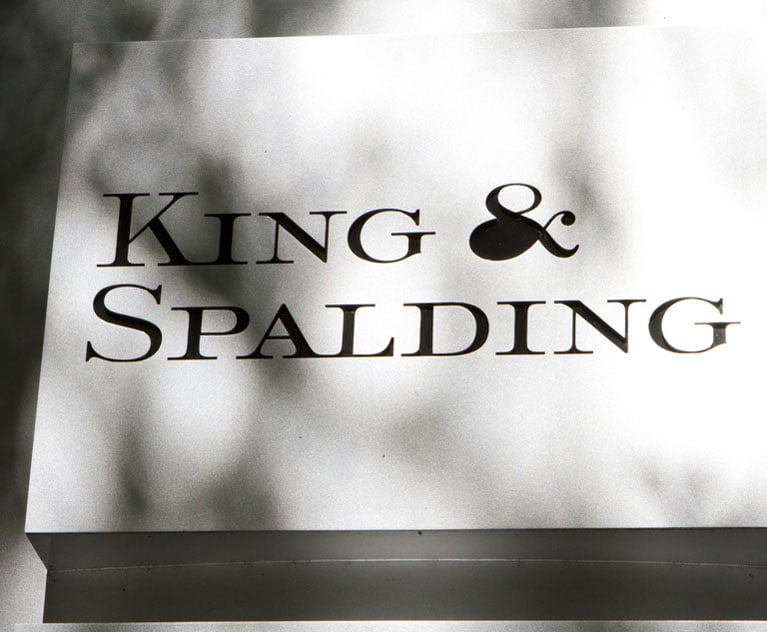 King & Spalding office sign. Photo: John Disney/ALM
King & Spalding office sign. Photo: John Disney/ALMMaryland Atty Pushes Judge to Grant Discovery in Reverse Discrimination Suit Against King & Spalding
Attorney Sarah Spitalnick, who is white, sought to rebut the law firm's claim that she was not harmed because she never applied for a fellowship program aimed at minorities.
November 14, 2024 at 08:11 PM
4 minute read
What You Need to Know
- A Maryland attorney said her federal lawsuit against King & Spalding should go forward.
- She said she has standing to bring her claim because she suffered an injury “in fact” and it was not “self-inflicted.”
A Maryland attorney said her federal lawsuit against King & Spalding should go forward to “redress the wrong done” by the firm’s “overt” discrimination against her when the firm said a first-year law student program was limited to “ethnically or culturally diverse” or “LGBT” applicants.
Attorney Sarah Spitalnick said in a filing earlier this month opposing the law firm’s Sept. 19 motion to dismiss in the U.S. District Court for the District of Maryland that she has standing to bring her claim because she suffered an injury “in fact” and it was not “self-inflicted” despite Spitalnick never applying for the program in 2021.
Spitalnick, who is now an attorney in Baltimore, was a first-year student at the University of Baltimore School of Law in 2021 when she saw an ad on a school job board seeking applications to the law firm’s 1L Summer Associate Leadership Council on Legal Diversity (LCLD) program.
“At the time of the defendant’s job posting, Ms. Spitalnick met all stated qualifications for the ... position aside from the requirement that she ‘must have’ an ‘ethnically or culturally diverse background or be a member of the LGBT community,’" her Nov. 8 filing stated.
“Whether or not King and Spalding believed it was promoting ‘diversity,’ the effect of its advertisement was to send a particularly toxic message to young lawyers: success in the profession is not a question of merit, but a function of skin color and sexual orientation, immutable characteristics that should neither constitute a bar nor a boon in the pursuit of a legal career,” the court document stated.
The document noted King & Spalding’s motion to dismiss was based on its argument that Spitalnick's claim lacked subject matter jurisdiction and failed to state a claim under the Federal Rules of Civil Procedure.
However, the document noted the Equal Employment Opportunity Commission issued a ruling that stated “there is reasonable cause to believe that [Spitalnick] was discriminated against because of her race and sexual orientation when she was deterred from applying for the summer associate position in violation of Title VII.”
Title VII of the Civil Rights Act of 1964 prohibits employment discrimination based on race, sexual orientation and gender identity, among other factors.
The document stated that Spitalnick suffered an “injury in fact”—despite the law firm’s claims she was deterred from applying for the LCLD position and therefore never submitted an application for the position.
“This claim ignores the EEOC determination letter finding expressly that there is a reasonable basis to conclude that Ms. Spitalnick was the victim of racial and sexual discrimination because she was deterred from applying for the LCLD position,” the document stated.
“Put differently, the absence of an application is evidence of discrimination, not the other way around. Defendant ignores well-established law that plaintiffs who are deterred from applying for employment because of the humiliation of certain rejection have standing to pursue employment discrimination letters.”
It also stated King & Spalding “ignores both the EEOC finding, which at an absolute minimum, indicates there is a factual question that cannot be resolved on a motion to dismiss, as well as the applicable Supreme Court and Fourth Circuit precedent stating that, where an application would constitute a ‘futile gesture,’ a victim of discrimination need not go through the motions of submitting a pointless application to have standing and to be able to recover on the merits.
“Despite this precedent, defendant urges the court to dismiss the complaint on the grounds that plaintiff never actually applied for the job at issue, claiming that effectively deterring a candidate from applying for a position on racial and sexual lines operates to deprive the deterred candidate of her day in court."
NOT FOR REPRINT
© 2025 ALM Global, LLC, All Rights Reserved. Request academic re-use from www.copyright.com. All other uses, submit a request to [email protected]. For more information visit Asset & Logo Licensing.
You Might Like
View All
Judge Orders Acquittal of Ex-Prosecutor on 1 of 2 Counts in Misconduct Trial Over Ahmaud Arbery Case
3 minute read
Did Ahmaud Arbery's Killers Get Help From Glynn County DA? Jury Hears Clashing Accounts

Jury Seated in Glynn County Trial of Ex-Prosecutor Accused of Shielding Ahmaud Arbery's Killers

Panel to Decide if Governor Should Suspend Georgia Lawyer From Elected Post
4 minute readTrending Stories
Who Got The Work
J. Brugh Lower of Gibbons has entered an appearance for industrial equipment supplier Devco Corporation in a pending trademark infringement lawsuit. The suit, accusing the defendant of selling knock-off Graco products, was filed Dec. 18 in New Jersey District Court by Rivkin Radler on behalf of Graco Inc. and Graco Minnesota. The case, assigned to U.S. District Judge Zahid N. Quraishi, is 3:24-cv-11294, Graco Inc. et al v. Devco Corporation.
Who Got The Work
Rebecca Maller-Stein and Kent A. Yalowitz of Arnold & Porter Kaye Scholer have entered their appearances for Hanaco Venture Capital and its executives, Lior Prosor and David Frankel, in a pending securities lawsuit. The action, filed on Dec. 24 in New York Southern District Court by Zell, Aron & Co. on behalf of Goldeneye Advisors, accuses the defendants of negligently and fraudulently managing the plaintiff's $1 million investment. The case, assigned to U.S. District Judge Vernon S. Broderick, is 1:24-cv-09918, Goldeneye Advisors, LLC v. Hanaco Venture Capital, Ltd. et al.
Who Got The Work
Attorneys from A&O Shearman has stepped in as defense counsel for Toronto-Dominion Bank and other defendants in a pending securities class action. The suit, filed Dec. 11 in New York Southern District Court by Bleichmar Fonti & Auld, accuses the defendants of concealing the bank's 'pervasive' deficiencies in regards to its compliance with the Bank Secrecy Act and the quality of its anti-money laundering controls. The case, assigned to U.S. District Judge Arun Subramanian, is 1:24-cv-09445, Gonzalez v. The Toronto-Dominion Bank et al.
Who Got The Work
Crown Castle International, a Pennsylvania company providing shared communications infrastructure, has turned to Luke D. Wolf of Gordon Rees Scully Mansukhani to fend off a pending breach-of-contract lawsuit. The court action, filed Nov. 25 in Michigan Eastern District Court by Hooper Hathaway PC on behalf of The Town Residences LLC, accuses Crown Castle of failing to transfer approximately $30,000 in utility payments from T-Mobile in breach of a roof-top lease and assignment agreement. The case, assigned to U.S. District Judge Susan K. Declercq, is 2:24-cv-13131, The Town Residences LLC v. T-Mobile US, Inc. et al.
Who Got The Work
Wilfred P. Coronato and Daniel M. Schwartz of McCarter & English have stepped in as defense counsel to Electrolux Home Products Inc. in a pending product liability lawsuit. The court action, filed Nov. 26 in New York Eastern District Court by Poulos Lopiccolo PC and Nagel Rice LLP on behalf of David Stern, alleges that the defendant's refrigerators’ drawers and shelving repeatedly break and fall apart within months after purchase. The case, assigned to U.S. District Judge Joan M. Azrack, is 2:24-cv-08204, Stern v. Electrolux Home Products, Inc.
Featured Firms
Law Offices of Gary Martin Hays & Associates, P.C.
(470) 294-1674
Law Offices of Mark E. Salomone
(857) 444-6468
Smith & Hassler
(713) 739-1250






